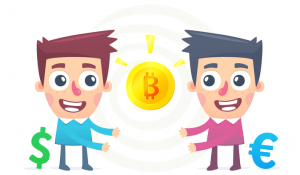Bitcoins are a Boy’s Best Friend
By ALAN KOHLER
Two interesting things happened at once over the weekend: the price of bitcoins hit a record high and the leaders of America’s biggest bank and the world’s largest asset manager said that governments would soon “crush” it — that it was all a big waste of time.
JP Morgan Chase CEO Jamie Dimon said that “if you’re stupid enough to buy it, you’ll pay a price for it one day” and the CEO of BlackRock, Larry Fink, said the price of bitcoin was basically an “index of money laundering”.
Around the same time on Friday night our time, that so-called money laundering index was racing to a new record of US$5856.10. It has retraced a bit, back to around US$5500, and a market cap of $US92.7 billion, which would make it Australia’s second largest company, ahead of Westpac.
This thing that Jamie Dimon says has “no actual value” is now up 65 per cent in a month and close to 1000 per cent (10 fold) in a year.
There are three theories about what has caused the latest surge: CoinBase, a digital currency exchange, announced that purchases up to $US25,000 would be instant from now, making it easier and faster to use; there are rumours that China will reverse its recent ban on initial coin offerings, which caused the price to drop 25 per cent last month; and another “fork” is set down for the bitcoin blockchain next month.
The last of those seems the most credible. There was a fork on August 1 in which bitcoin investors were given an equal amount of a new creation called “Bitcoin Cash”, which popped up to $US800 each in August and have now settled back to $US311 each — a market cap of more than $US5 billion.
Having seen that much value created from thin air, “investors” obviously see another fork as a pretty good thing and earnestly to be desired. The next fork is to be called Segwit2x and will happen sometime in November.
The description of the bitcoin phenomenon that has most struck a chord with me came from a tech journalist named Dana Blankenhorn, who wrote that bitcoins are like diamonds.
“For all its technical problems a bitcoin token is rare and illiquid, thus highly prized for its scarcity — worth the extraordinary expense to mine and traded among elites based on that scarcity.
“Bitcoin was designed to be a single global market, under decentralised control, but it is evolving into multiple markets, with Chinese and American players battling for control. Right now, the Chinese have the advantage.”
The price of bitcoins is not rising exponentially because of a rational belief that it is the future of money — although a lot of people think that — but for the more simple reason that they are desirable and there’s a shortage of them.
Holders of them are not selling, while new buyers are coming to the market all the time, fascinated by what’s going on and wanting a piece of this action. And we are a very long way from exhausting the global supply of speculators and gamblers keen to jump on the latest bandwagon.
Diamonds are useful as a grinding medium because they are so hard, but the value of them is based on scarcity and marketing — De Beers’ magnificent ad campaign in 1947 based on the slogan “Diamonds are Forever”, followed up by that early social media influencer, Marilyn Monroe, with the song: “Diamonds Are a Girl’s Best Friend”.
Bitcoin’s organisers and traders seem to be overwhelmingly male, and the marketing proposition is that it’s cool — a way to be a mild anarchist, and express dissatisfaction with the state of the global monetary and financial system (and who isn’t dissatisfied with it?) while at the same time maybe get rich.
One guy in the Netherlands has famously sold everything, put it all on bitcoin and moved his family into a caravan park, which just goes to prove PT Barnum’s dictum that there is a sucker born every minute.
The reason Didi Taihuttu looks like one of Mr Barnum’s suckers is that neither he nor anyone else understands the value of what he has bought with all of his family’s worldly possessions. He might get rich and leave his children billionaires; he might die in the camping park, a pauper. He doesn’t know.
Last time I wrote about this, I called it a scam; not long after that, Jamie Dimon called it a fraud. Neither of us actually knows what he’s talking about, but then, on this subject, nobody does.
A lot of people understand blockchain, the technology behind bitcoin, but nobody has any idea what a bitcoin is worth, or should be worth.
For that reason, it looks like a bubble at the moment but it seems unlikely that bitcoin will go to zero. Bubbles rarely do go to zero when they burst: tulip bulbs still cost money, so does Tokyo real estate, and dotcom stocks are having a second coming.
Bitcoin, ethereum, Ripple and a few others are interesting and disruptive technologies. There is scamming involved, but there is also something pretty big going on — definitely with blockchain, probably with cryptocurrencies, if only as a means of global money transfer, and maybe with bitcoin.
But if the world’s governments want to crush it, they had better get cracking.

